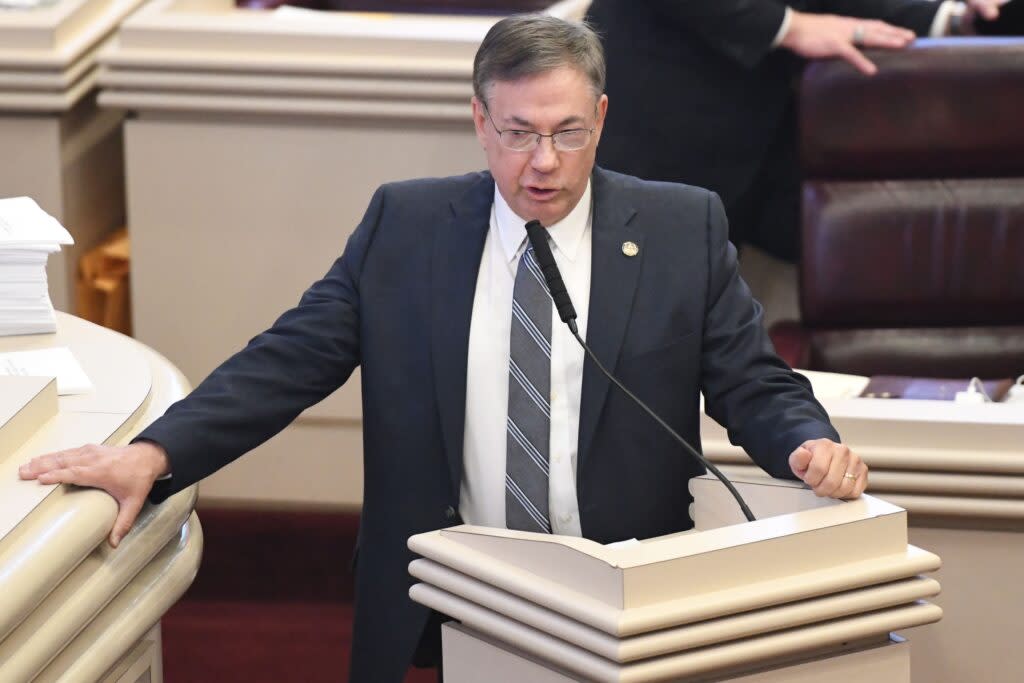Alabama House approves expansion of state ‘Don’t Say Gay’ law

- Oops!Something went wrong.Please try again later.
- Oops!Something went wrong.Please try again later.
- Oops!Something went wrong.Please try again later.
Rep. Mack Butler, R-Rainbow City, speaks during a debate over his bill expanding Alabama's "Don't Say Gay" law in the Alabama House of Representatives on April 23, 2024 at the Alabama Statehouse in Montgomery, Alabama. The bill would expand the current prohibitions on discussions of gender or sexuality from fifth grade to eighth grade. (Brian Lyman/Alabama Reflector)
The Alabama House of Representatives Tuesday approved a major expansion of the state’s “Don’t Say Gay” law after a two-hour debate.
HB 130, sponsored by Rep. Mack Butler, R-Rainbow City, would expand the limitations on teachers addressing sexual orientation and gender identity, currently banned in kindergarten through fifth grade instruction, to kindergarten through eighth grade. The bill would also limit pride flags in the classroom.
“We’ve had a few teachers go rogue, and you’d be appalled at some of the things that are being taught. You’d be appalled at some of the things right now that you’re seeing on Chromebooks,” Butler said.
The House approved the measure on a 74-25 vote.
GET THE MORNING HEADLINES DELIVERED TO YOUR INBOX
The bill would have previously expanded the ban through 12th grade, but Rep. Barbara Drummond, D-Mobile, offered an amendment to limit the ban on sexual orientation and gender identity instruction to the eighth grade.
Butler said that was a friendly amendment supported by the Alabama State Department of Education and thanked Drummond for bringing it.
“I’m trying to put lipstick on something that I think is going to be scarring our kids,” Drummond said.
Democrats said the bill could have unintended consequences, especially as it related to children’s mental health.
Rep. Marilyn Lands, D-Huntsville, said that in her background as a counselor, she’s worked with LGBTQ+ youth that have been ostracized and bullied for of their identity.
Lands named Nigel Shelby, a 15-year-old from Huntsville who died by suicide because of bullying. She said to the body that each legislator “knows people that have been personally affected by this kind of cruelty.”
Several Democrats expressed concerns the bill could contribute to suicide rates. Asked by Rep. Phillip Ensler, D-Montgomery, to respond, Butler said he didn’t believe that would be the case “at all.”
“You still would be able to go to your teacher and talk to your teacher. You wouldn’t be able to raise your hand in class and have an open discussion about what you’re going through, which I doubt is what would happen anyway,” Butler said.
Ensler said he was missing the point. He said that what children will take away from the legislation is that the Legislature is homophobic. He said anytime lessons on identity are prohibited, such as discussion on religion and ethnicity, it makes people feel like they don’t matter and are not seen as equal.
“That is so disturbing, and I just cannot believe that we’re going to potentially now pass something any moment here that could lead to a child — a child — taking his or her own life because of something that we’re going to do here today,” Ensler said.
Other Democrats questioned which rainbow flag the legislation would outlaw.
Rep. Neil Rafferty, D-Birmingham, asked whether the bill would be banning the traditional rainbow flag or the solidarity flag, also known as the progress flag. There are at least 25 pride flags, according to the Human Rights Campaign.
“At what point would you know that you’re coming upon another insignia or symbol that would be showing a student that might be struggling, hurting or are really trying to just make the best of what they can and talk to a teacher?” Rafferty asked.
He offered an amendment that would instead prohibit a teacher from having discussions intended to change a student’s sexual orientation or gender identity.
“Very simple. It changes that from regarding to getting to really what the intent of this bill is, and that is to protect children,” Rafferty said.
The amendment was defeated on a 70-27 vote.
Rep. Patrick Sellers, D-Birmingham, said that the issue was not in school, but at home and social media. He said the body was trying to “legislate morality within the home.”
“I have a little pause because I think we’re trying to do something that we cannot do,” Sellers said.
He added that teachers don’t have the time to teach material outside of the school curriculum.
“Their time is so scheduled, along with dealing with all that they deal with, especially with discipline issues that they deal with within the school system, they don’t have time to teach what I think what you’re suggesting that has been taught,” Sellers said.
Republicans spoke in support of the bill, saying that teachers need to focus on teaching the subject they are assigned.
Rep. Ernie Yarbrough, R-Trinity, said that it is “not the job of public education to sexualize our kids.” He said it was “disingenuous” to say it’s a “ban on teaching historical facts.”
“The sooner we realize that teachers need to focus on teaching, reading, writing and arithmetic, and leaving the purity and the minds, in regard to sexual knowledge, to the parents of our families, the better off our country will be,” Yarbrough said.
The bill goes to the Senate for consideration.
The post Alabama House approves expansion of state ‘Don’t Say Gay’ law appeared first on Alabama Reflector.

